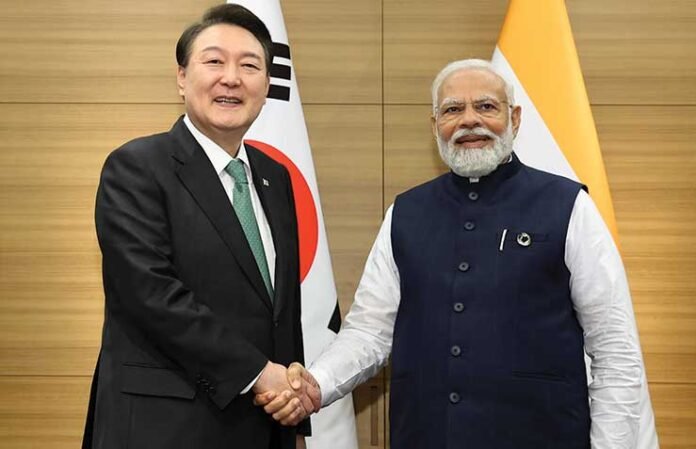Despite the convergence of their strategic interests and historical ties, the defence relationship between India and South Korea, two pivotal democracies in Asia, remains underdeveloped. Both nations are situated in the strategically significant Indo-Pacific region, where the growing security challenges and changing power dynamics necessitate increased collaboration among states that share similar interests. The necessity of a robust India-South Korea defence partnership has never been more urgent, as the Indo-Pacific region is characterised by heightened militarisation, territorial disputes, and increasing strategic competition.
Current State of Defence Cooperation
The defence cooperation between India and South Korea, while notable, has been characterised by a cautious and incremental approach. The bilateral relationship has primarily focused on military exchanges, joint exercises, and defence trade, with a few significant milestones hinting at the potential for deeper collaboration. However, there seems to be a serious disconnect at the top policy level, which has impeded the full realisation of this partnership.
Military Exercises and Exchanges
In recent years, defence cooperation between India and South Korea has strengthened through a series of military exercises and exchanges, underscoring their shared commitment to regional stability and security. The biennial SAHYOG-HYEOBLYEOG exercise between the Indian and Korean coast guards, which focusses on search and rescue, anti-piracy, and maritime law enforcement, highlights their mutual emphasis on maritime security.
Both nations are currently exploring the possibility of regular army-to-army exercises to enhance tactical and operational cooperation. Naval cooperation has also been significant, with Indian Navy port visits to South Korea facilitating joint exercises and personnel exchanges, further reinforcing their defence ties.
Despite regular defence dialogues at the ministerial and senior official levels, the absence of a comprehensive and sustained strategic dialogue focused on long-term defence and security policy alignment hampers the full potential of the India-South Korea defence partnership. A more structured, high-level strategic dialogue mechanism is essential to synchronise the long-term security objectives and policies of both nations
In addition, regular defence educational exchanges and industry cooperation events have fostered mutual understanding and innovation, positioning both countries for deeper collaboration. Joint participation in multinational frameworks, such as United Nations Peacekeeping Operations (UNPKO), further strengthens their contributions to global security.
Defence Trade
The defence trade between India and South Korea has seen significant growth in recent years. This partnership gained momentum in 2017 when Larsen & Toubro signed an agreement for the procurement of K9 Vajra-T howitzers, locally produced under India’s ‘Make in India’ initiative. Hindustan Shipyard Limited and Hyundai Heavy Industries further strengthened naval cooperation in 2018 by signing an agreement for the maintenance of Indian naval ships.
The partnership advanced in 2019 with the co-development of a Medium-Range Surface-to-Air Missile (MRSAM) system between LIG Nex1 and Bharat Electronics Limited, alongside a deal for K30 Biho anti-aircraft guns with Hanwha Aerospace. In 2020, discussions on submarine technology collaboration under India’s Project-75I highlighted growing interest in South Korea’s KSS-III capabilities.
Ongoing collaborations in naval shipbuilding and defence electronics have also emerged, involving key players like Hyundai Heavy Industries, LIG Nex1, and Hanwha Systems. These developments emphasize joint development, technology transfer, and strengthening of defence industries, all of which contribute to regional stability and security in the Indo-Pacific.
A stronger defence partnership between India and South Korea would not only enhance their bilateral relationship but also contribute to a more stable and secure Indo-Pacific
Challenges and Limitations
Several factors are currently impeding India and South Korea’s full potential for defense cooperation. India’s complex and often sluggish defence procurement process, combined with South Korea’s cautious approach to defence exports and technology transfers, has led to prolonged negotiations and delays in project implementation. Additionally, a significant trust deficit at the highest levels between the two countries continues to hinder efforts to elevate India-South Korea defence cooperation to the next level. Therefore, diplomats in both capitals must prioritise mutual trust-building as the top item on their agenda.
Despite regular defence dialogues at the ministerial and senior official levels, the absence of a comprehensive and sustained strategic dialogue focused on long-term defence and security policy alignment hampered the full potential of the India-South Korea defence partnership. A more structured, high-level strategic dialogue mechanism is essential to synchronise the long-term security objectives and policies of both nations. Currently, the partnership primarily concentrates on defence industry cooperation and defence trade, under prioritizing and neglecting other crucial aspects of the relationship. This narrow approach must come to an end.
South Korea’s defence focus on the Korean Peninsula, particularly regarding North Korea, contrasts with India’s strategic concerns on its northern borders with China and Pakistan. This divergence in priorities has also limited collaboration, especially in the broader Indo-Pacific region. To unlock the full potential of cooperation, the top defence establishments of both nations must address this misalignment and focus more on common areas of interest to achieve greater policy alignment and engagement.
Despite the potential for collaboration in defence production and research, the lack of substantial joint ventures or technology transfer agreements between Indian and South Korean defence companies has impeded the development of a sustainable defence-industrial partnership. The existing collaboration remains confined to isolated projects rather than a comprehensive industrial partnership. If not improved in the near future, this lack of industrial collaboration could adversely affect the overall prospects of India-Korea cooperation.
India and South Korea need to establish a high-level, high-powered strategic defence dialogue mechanism to discuss long-term security interests, align defence strategies, and identify areas of mutual interest
Furthermore, the absence of an institutional mechanism for regular dialogue between defence and security experts from India and South Korea has created and widened major gaps in strategic thinking between the strategic communities of both nations. Although the need for an India-Korea Defence Forum has been recognised by scholars from both sides for a long time, no initiative has been taken to establish it. Such a Defense Forum is essential for deepening strategic ties, enabling policy formulation, and addressing emerging threats through regular exchanges and coordinated initiatives. By focusing on defense policy alignment, technology exchange, and non-traditional security challenges, the forum would foster a comprehensive partnership, crucial for regional stability and addressing future challenges in the Indo-Pacific.
Imperatives for Enhanced Cooperation
The Indo-Pacific region is undergoing profound geopolitical transformations, with new security architecture emerging across the region. In this context, India and South Korea, both of which play crucial roles in shaping the region’s security framework, must strengthen their defence cooperation to address shared challenges and contribute to regional stability.

Strategic Environment in the Indo-Pacific
The Indo-Pacific has become a focal point of global strategic competition, particularly due to China’s expanding influence and assertive behaviour. The increasing militarisation of the South China Sea, the strategic implications of the Belt and Road Initiative, and China’s growing naval presence in the Indian Ocean are of particular concern to both India and South Korea. Additionally, the US Indo-Pacific strategy, which seeks to counterbalance China’s influence by fostering alliances and partnerships with regional powers, presents an opportunity for India and South Korea to enhance their defence ties.
Both nations need to enhance the frequency and complexity of joint military exercises, including tri-service operations involving the army, navy, and air force. Expanding naval exercises in the Indian Ocean Region and conducting joint air force exercises would improve interoperability and foster essential trust between the armed forces
Mutual Strategic Interests
The Indo-Pacific region increasingly views India as a net security provider due to its growing economic and military capabilities. Its strategic location and commitment to maintaining freedom of navigation and maritime security align with South Korea’s interests in ensuring stability in Northeast Asia and maintaining open sea lines of communication. South Korea, with its advanced technological capabilities and strategic importance as a US ally, plays a critical role in maintaining the balance of power in Northeast Asia. A stronger defence partnership between India and South Korea would not only enhance their bilateral relationship but also contribute to a more stable and secure Indo-Pacific.
Future Roadmap for Strengthening Defence Cooperation
To fully realise the potential of their defence partnership, India and South Korea must adopt a forward-looking strategy that addresses existing challenges and leverages their respective strengths. The following roadmap outlines key steps for strengthening defence cooperation:
India and South Korea need to establish a high-level, high-powered strategic defence dialogue mechanism to discuss long-term security interests, align defence strategies, and identify areas of mutual interest. This dialogue should go beyond the current mechanisms, which are too narrow in both participation and focus, and involve broader strategic communities from both countries to explore new opportunities for collaboration in emerging domains such as cyber defence, space security, and AI-led warfare. Institutionalising this dialogue would ensure a sustained and focused effort to strengthen their defence partnership.
Both nations need to enhance the frequency and complexity of joint military exercises, including tri-service operations involving the army, navy, and air force. Expanding naval exercises in the Indian Ocean Region and conducting joint air force exercises would improve interoperability and foster essential trust between the armed forces. The current level of personnel exchanges, training programs, and officer exchanges is insufficient to significantly deepen the strategic partnership. Therefore, it is imperative to elevate these exchanges to a more substantial and impactful level to fully realise the potential of defence cooperation.
To overcome bureaucratic challenges and enhance defence trade, India and South Korea need to streamline their defence procurement processes and foster a more conducive environment for defence companies. India should encourage and facilitate Korean firms, with their advanced technology and financial resources, to co-develop and co-produce defence equipment, particularly in areas such as cyber defence, unmanned systems, missile technology, and AI warfare systems. The Indian government could also consider introducing a special incentive package for Korean defence companies to encourage and facilitate investment in India’s defence sector, thereby strengthening industrial collaboration, driving technological innovation, and promoting economic growth.
India should encourage and facilitate Korean firms, with their advanced technology and financial resources, to co-develop and co-produce defence equipment, particularly in areas such as cyber defence, unmanned systems, missile technology, and AI warfare systems
India and South Korea should collaborate more closely on regional security initiatives, such as participating in multilateral forums, contributing to humanitarian assistance and disaster relief operations, and conducting joint exercises with other regional partners. Currently, this area receives very little attention. A coordinated approach to regional security issues such as countering piracy, ensuring freedom of navigation, and responding to natural disasters will enhance their strategic presence in the Indo-Pacific and contribute to regional stability.
To overcome differing strategic priorities, India and South Korea should work harder to align their strategic interests in the Indo-Pacific. Currently, they are offering only lip service. This alignment could involve coordinating policies on key issues such as maritime security, counterterrorism, and regional stability. Both nations should also explore opportunities for trilateral or multilateral cooperation with other regional powers, such as Japan, Australia, and the United States, to address common security challenges and enhance their collective security posture in the region.
Conclusion
India and South Korea stand at a pivotal juncture in their defence relationship, with significant opportunities to enhance their bilateral cooperation amid an evolving geopolitical landscape in the Indo-Pacific. By addressing existing challenges and adopting a comprehensive, forward-looking strategy, both countries can unlock the full potential of their defence partnership. A robust India-South Korea defence relationship will not only strengthen bilateral ties but also contribute to regional stability and security, reflecting their shared commitment to peace and prosperity in the Indo-Pacific and beyond.
–The writer is Director of Peace Programme at Asia Institute in Seoul, South Korea. A central figure in Korea-India relations, he is popularly known as the “Father of India-Korea Strategic Partnership” in recognition of his work in promoting India-Korea defence cooperation. He was honoured with honorary citizenship of Korea in 2018 by the Korean Government for his leading social and academic work.. The views expressed are of the writer and do not necessarily reflect the views of Raksha Anirveda






